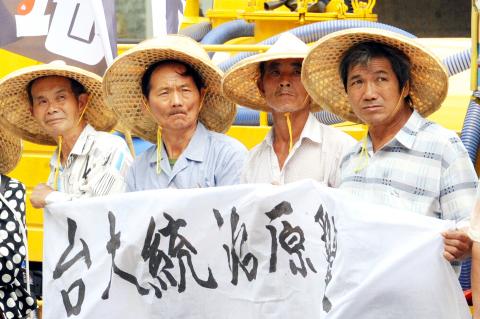Hundreds of farmers from across the country yesterday staged a rally in Taipei to protest against the government’s “arbitrary regulations” that deprive them of their right of abode and their livelihood.
The parade started from the Council of Agriculture’s Forestry Bureau and ended at Ketagalan Boulevard in front of the Presidential Office.
Holding banners that read: “Give us back our land,” the protesters, many of whom were elderly farmers, appealed to the government to allow them to continue growing fruit and crops on the land that they have cultivated for years, instead of restraining their right of abode by designating these areas as national parks.

Photo: George Tsorng, Taipei Times
Tseng Te-tsung (曾得總), general-director of the parade and chairperson of Taiwan Original Cultivation Farmers’ Association, said many of the farmers and their families had been farming their lands since the Japanese colonial era (from 1895 to 1945) or long before that.
However, when the Chinese Nationalist Party (KMT) government took over from the Japanese colonial government, it arbitrarily designated large tracts of the land as national parks and placed them under state ownership, Tseng said.
A fruit farmer surnamed Chen (陳) from Greater Kaohsiung’s Tianliao District (田寮) said: “We farmers don’t ask for a wealthy life, but when the government takes our land, it not only deprives us of our possessions, but also puts us out of work.”
Chen accused the government of violating the Constitution, which guarantees protection of people’s right of habitation and livelihood.
He added that the government should assist self-farming land owners and people who live on the land when planning and redistributing land resources.
Many farmers don’t understand the law that protects their rights and many were not given the chance to apply and register for ownership over the land, he said.
Many farmers are only allowed to temporarily rent the farmlands that they have been living on for decades, he said.
A fruit farmer surnamed Tsai (蔡), having been forced to tear down many parts of his house already, said he was recently fined another NT$120,000 for occupying state-owned property.
He said the government has been bullying farmers for many years, but all they ask for is the legitimacy to continue farming and living on the land.
The farmers urged the government to rethink its land redistribution policy instead of arbitrarily driving out those who have lived on the land for years or accusing them of breaking the law.
Taiwan Solidarity Union Chairman Huang Kun-huei (黃昆輝), who took part in the protest, said the government was wrong to dispossess farmers of the land and prosecute them for occupying state land.
“If these cases continue to happen, it will only generate hatred among the people,” he said.
In a statement released last night, the Forestry Bureau said: “The management of national parks and related measures will be modified in consideration of the farmers.”
“Standard acts of changing national parks into private land will be discussed with other related government agencies,” it added.

A group of Taiwanese-American and Tibetan-American students at Harvard University on Saturday disrupted Chinese Ambassador to the US Xie Feng’s (謝鋒) speech at the school, accusing him of being responsible for numerous human rights violations. Four students — two Taiwanese Americans and two from Tibet — held up banners inside a conference hall where Xie was delivering a speech at the opening ceremony of the Harvard Kennedy School China Conference 2024. In a video clip provided by the Coalition of Students Resisting the CCP (Chinese Communist Party), Taiwanese-American Cosette Wu (吳亭樺) and Tibetan-American Tsering Yangchen are seen holding banners that together read:

UNAWARE: Many people sit for long hours every day and eat unhealthy foods, putting them at greater risk of developing one of the ‘three highs,’ an expert said More than 30 percent of adults aged 40 or older who underwent a government-funded health exam were unaware they had at least one of the “three highs” — high blood pressure, high blood lipids or high blood sugar, the Health Promotion Administration (HPA) said yesterday. Among adults aged 40 or older who said they did not have any of the “three highs” before taking the health exam, more than 30 percent were found to have at least one of them, Adult Preventive Health Examination Service data from 2022 showed. People with long-term medical conditions such as hypertension or diabetes usually do not

POLICE INVESTIGATING: A man said he quit his job as a nurse at Taipei Tzu Chi Hospital as he had been ‘disgusted’ by the behavior of his colleagues A man yesterday morning wrote online that he had witnessed nurses taking photographs and touching anesthetized patients inappropriately in Taipei Tzu Chi Hospital’s operating theaters. The man surnamed Huang (黃) wrote on the Professional Technology Temple bulletin board that during his six-month stint as a nurse at the hospital, he had seen nurses taking pictures of patients, including of their private parts, after they were anesthetized. Some nurses had also touched patients inappropriately and children were among those photographed, he said. Huang said this “disgusted” him “so much” that “he felt the need to reveal these unethical acts in the operating theater

Heat advisories were in effect for nine administrative regions yesterday afternoon as warm southwesterly winds pushed temperatures above 38°C in parts of southern Taiwan, the Central Weather Administration (CWA) said. As of 3:30pm yesterday, Tainan’s Yujing District (玉井) had recorded the day’s highest temperature of 39.7°C, though the measurement will not be included in Taiwan’s official heat records since Yujing is an automatic rather than manually operated weather station, the CWA said. Highs recorded in other areas were 38.7°C in Kaohsiung’s Neimen District (內門), 38.2°C in Chiayi City and 38.1°C in Pingtung’s Sandimen Township (三地門), CWA data showed. The spell of scorching